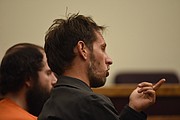Trial in deadly fitness center shooting delayed
Accused killer Jonathan Douglas Shaw saw his trial continued into the next jury term after Flathead District Court Judge Dan Wilson determined Wednesday that a delayed mental health evaluation could leave prosecutors without time to adjust their case.
Authorities arrested Shaw following a deadly shootout in the parking lot of Fuel Fitness in Kalispell nearly a year ago, brought to an end after a gym patron fetched a gun from his vehicle and shot Shaw, according to court documents. Matthew Hurley, an employee of the fitness center, died in the shooting. Shaw and the gym patron, identified as William Keck, both suffered wounds.
Shaw has remained in county jail, held on $1 million bond, since the shooting. He pleaded not guilty to counts of deliberate homicide and attempted deliberate homicide in Flathead District Court in October 2021.
In June, Shaw’s attorney, Liam Gallagher, indicated that he would pursue a defense around a developmental disability or mental disease or disorder that left Shaw without the state of mind required for the deliberate and attempted homicide charges. A mental health evaluation was scheduled for mid-August, but later delayed.
During a Sept. 7 status hearing, Deputy County Attorney John Donovan told Wilson that, as of that morning, the evaluation was set for Sept. 8-9. With Shaw’s jury trial expected to start Sept. 19, he asked for a continuance.
If the evaluation gave the mental health defense the green light, prosecutors would need to prepare and likely would want their own evaluation performed, Donovan said. He also floated — but quickly walked back — the idea of the judge sanctioning Gallagher and Shaw for failing to comply with discovery by precluding that defense.
“Given the timing of the presently scheduled evaluation, [the] defendant cannot comply with this obligation unless he does so on the very eve of the trial,” Donovan wrote in his motion and argued before Wilson.
When Wilson pushed back on the idea of a sanction, Donovan clarified and said he sought just the continuance.
BUT GALLAGHER took umbrage with Donovan’s suggestion that the defense was at fault. He blasted Donovan for failing to arrange for a mental health evaluation for the prosecution in the months since the gist of Shaw’s defense was revealed.
“[Donovan] has had this information for three months,” Gallagher said. “He hasn’t done anything but sit on his hands and come to me.”
“We’re ready for trial,” Gallagher added.
Wilson, though, disagreed and noted that without the evaluation, Gallagher was missing a key piece of information. Wilson also pointed to arguments during July’s pretrial conference, where the present scenario was discussed.
Back then, all sides agreed that if an evaluation came back allowing for a mental health defense then the prosecution would get time to arrange for its own assessment of Shaw, possibly resulting in a continuance, Wilson said.
“Maybe your memory is better than mine,” Gallagher said.
“I have a transcript, actually,” Wilson replied.
The back-and-forth was one of several as Wilson and Gallagher sparred over the latter’s objection to the continuance.
“He’s not asking for the sanction so why are you using the court’s time arguing about a motion not on the table,” Wilson shot at Gallagher at one point, a moment later describing the defense attorney as having an “excitable predilection to take legal arguments as personal attacks.”
Despite the fiery exchanges, Wilson initially indicated he considered the prosecution’s request premature. Why not wait until the evaluation occurs and go from there, he asked. If Gallagher could proceed with his defense, prosecutors could examine the results and decide what to do then.
WILSON’S MIND changed after probing Gallagher on his expected turnaround time on the results of Shaw’s evaluation.
The judge began by pinning Gallagher down to the circumstances wherein he would hand over the information, which Gallagher said was the moment he would opt to pursue the mental health defense. Wilson noted that the defense attorney could wait until the eleventh hour.
“You said a reasonable amount of time and I am trying to figure out what that means to you,” he said.
“Give me a couple of days, let me sleep on it,” Gallagher replied. “Let me talk to my client.”
Wilson pressed Gallagher to commit to a date, but the defense attorney declined.
“I plan on never making that commitment,” Gallagher said.
When Wilson asked if he could wait until prosecutors rested their case to decide upon his defense, Gallagher said he believed he could.
That proved enough for Wilson, though Gallagher continued to argue that Donovan could have asked for his own evaluation in the intervening weeks and months.
“If your position is that you have no obligation until after the state has rested, it would seem under these circumstances the state won’t be able to make a rational decision,” Wilson said.
The judge deemed that cause enough to rule on the motion to continue — and side with prosecutors.
A new pretrial conference in the case is now scheduled for Jan. 4 with a trial to proceed after that date. Both deliberate homicide and attempted deliberate homicide carry a maximum sentence of up to 100 years behind bars. Extra time can be added — between two and 10 years — owing to the use of a firearm.
News Editor Derrick Perkins can be reached at 758-4430 or dperkins@dailyinterlake.com.




